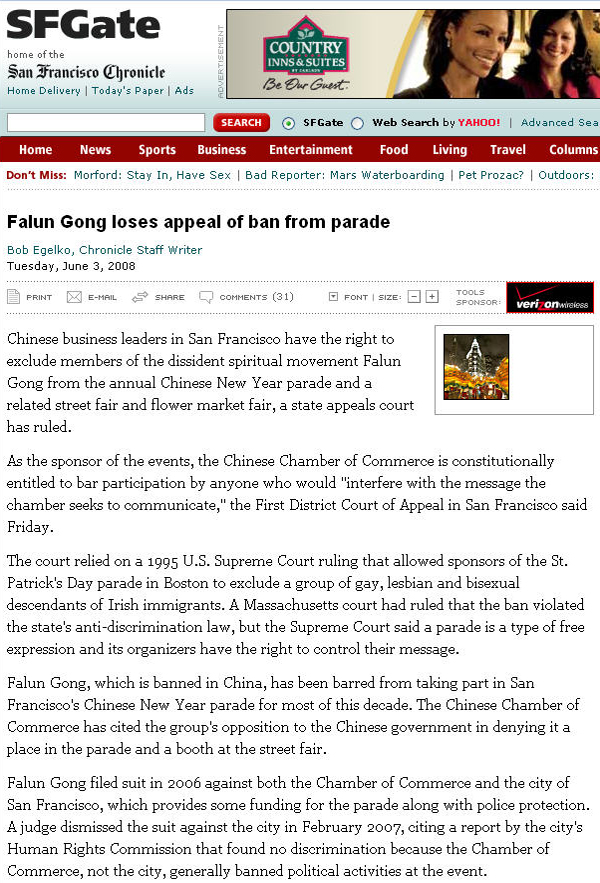《旧金山编年史》6月3日报道,旧金山上诉法院裁定,旧金山华人商界领袖有权在一年一度的中国农历新年游行及相关的街庆和花市活动中拒绝接纳法轮功。
上周五,旧金山第一区上诉法院裁定,作为游行活动的主办方,中华总商会在宪法上有权禁止那些“干扰中华总商会讯息沟通”的团体参与。
1995年,波士顿圣帕特里克节游行主办方禁止爱尔兰移民后裔中的男、女同性恋及双性恋参加。马萨诸塞州一法院裁定这一禁令违反了该州的反歧视法,但美国最高法院允许主办方这么做,认为游行是自由表达的一种类型,组织者有权管理他们的讯息。这是旧金山上诉法院裁决的依据。
在这十年中的大部分时间里,法轮功被禁止参加美国旧金山中国农历新年游行。中华总商会引述了法轮功反对中国政府的言论,拒绝在游行及街庆活动中给他们一个位置。
2006年,法轮功对中华总商会及旧金山市提起诉讼,后者为游行警力保护提供资金。一名法官于2007年2月驳回了对城市的诉讼,引述了旧金山市人权委员会的报告,认为并未发现任何歧视现象,因为是中华总商会,而非旧金山市,在这项活动中普遍禁止政治活动。法轮功没有对此裁决提出上诉。
后来,这位法官同样驳回了法轮功对中华总商会的诉讼。法轮功于是立刻发起挑战,他们承认,1995年最高法院的裁决适用于中国农历新年游行,但辩称街庆及花市是商业活动,不属于陈述中的自由表达类型,是反歧视法所涵盖的范围。法轮功在街庆及花市活动中同样被排除在外。
上诉法院注意到街庆活动包括文化表演,花市则由一个小型游行作为开始,因而不同意法轮功的观点。
法院说,如果法轮功被允许参与这些活动,当不同异见者自由参与或者抗议任何活动的时候,围观者“很可能把这些法轮功的观点与中华总商会联系起来”。
由于原告对被告的起诉,干涉了被告的言论自由,根据加利福尼亚州一项惩罚原告的法律,法院同时裁定法轮功必须向中华总商会支付法律费用。中华总商会计算法律费用总计约数十万美元。
“我们希望法轮功现在停止滥诉。”中华总商会律师兰迪·瑞德(Randy Riddle)说:“旧金山上诉法院的裁决是一个重要决定,完全适用于第一修正案。”
判决文件地址:www.courtinfo.ca.gov/opinions/documents/A115535.PDF
Falun Gong loses appeal of ban from parade
Chinese business leaders in San Francisco have the right to exclude members of the dissident spiritual movement Falun Gong from the annual Chinese New Year parade and a related street fair and flower market fair, a state appeals court has ruled.
As the sponsor of the events, the Chinese Chamber of Commerce is constitutionally entitled to bar participation by anyone who would "interfere with the message the chamber seeks to communicate," the First District Court of Appeal in San Francisco said Friday.
The court relied on a 1995 U.S. Supreme Court ruling that allowed sponsors of the St. Patrick's Day parade in Boston to exclude a group of gay, lesbian and bisexual descendants of Irish immigrants. A Massachusetts court had ruled that the ban violated the state's anti-discrimination law, but the Supreme Court said a parade is a type of free expression and its organizers have the right to control their message.
Falun Gong, which is banned in China, has been barred from taking part in San Francisco's Chinese New Year parade for most of this decade. The Chinese Chamber of Commerce has cited the group's opposition to the Chinese government in denying it a place in the parade and a booth at the street fair.
Falun Gong filed suit in 2006 against both the Chamber of Commerce and the city of San Francisco, which provides some funding for the parade along with police protection. A judge dismissed the suit against the city in February 2007, citing a report by the city's Human Rights Commission that found no discrimination because the Chamber of Commerce, not the city, generally banned political activities at the event.
Falun Gong did not appeal that ruling, but challenged the same judge's earlier dismissal of its suit against the Chinese Chamber of Commerce. The group conceded that the 1995 Supreme Court ruling applied to the Chinese New Year parade but argued that the street fair and flower fair, from which it was also excluded, are commercial events, not statements of free expression, and are covered by anti-discrimination laws.
The appeals court disagreed, noting that the street fair includes cultural performances and the flower market fair begins with a small parade.
While the dissident group is free to attend or protest any of the events, the court said, onlookers "would likely associate the Chamber (of Commerce) with Falun Gong's views" if the group were allowed to participate in the events.
The court also ruled that Falun Gong must pay the Chamber of Commerce's legal bills, under a state law penalizing plaintiffs whose lawsuits interfere with their opponents' freedom of speech. The chamber said the bills would amount to several hundred thousand dollars.
"It is our hope that Falun now stops this abusive lawsuit," said Randy Riddle, lawyer for the business group. "This is an important decision for First Amendment rights."
Roger Myers, a lawyer for Falun Gong, said the ruling is an unwarranted expansion of the Supreme Court's St. Patrick's Day decision and his clients may appeal to the state Supreme Court.
"The further you extend (the Supreme Court ruling), the more you narrow California law protecting people against discrimination," he said.
The ruling is available at www.courtinfo.ca.gov/opinions/documents/A115535.PDF.
(San Francisco Chronicle, Tuesday, June 3, 2008)

原文网址:http://www.sfgate.com/cgi-bin/article.cgi?f=/c/a/2008/06/02/BACJ11219N.DTL

